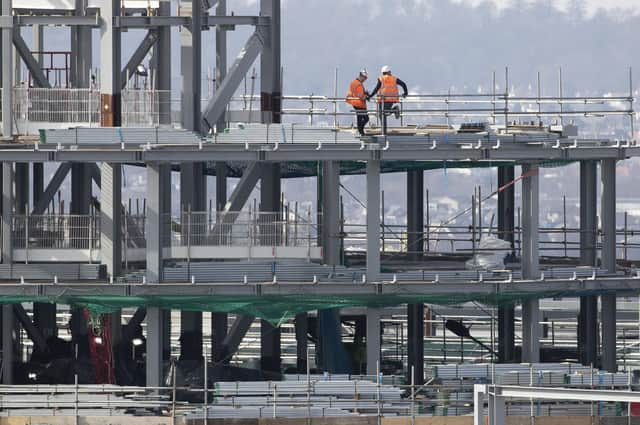Business comment: Taking the joined-up approach to infrastructure


Almost every news bulletin since the beginning of the Covid-19 pandemic has seen new phrases enter our common vocabulary.
Whilst nor entirely new, one such phrase, used regularly when comment is made on what might be done to respond to the economic crisis created by the pandemic is, “shovel ready”. At face value it appears quite simple.
Advertisement
Hide AdAdvertisement
Hide AdIt describes a project where a shovel can immediately be put in the ground to begin the construction of a new house, factory, office or maybe a bridge, a school or other piece of physical infrastructure.
So why is shovel ready important?
Well, an important strand of the economic recovery is likely to be based on new and accelerated capital investment which will, in the short term, create or support jobs in the construction and related sectors, and in the longer term create improved business, social or transport infrastructure to accelerate and support stronger economic growth.
I often simplify the process of development and construction to say that there are four key elements required: land to build on, someone to build it, the money to pay for it and someone to occupy it (or the realistic expectation of an occupier).
And sitting around the whole of any project, there will be multiple permissions and approvals required before work can commence, which will include, amongst others, planning permission and building warrants.
So, there are significant complexities faced before any development can be considered shovel ready, which are often time consuming and costly to overcome.
If shovel ready is to make a difference the challenge for both the public and private sectors is whether we have a broad enough selection of available projects, where the criteria I mention above can be fulfilled, and which can play a role in getting us back on to a path of inclusive growth.
I would suggest that we are probably not in that position. And the reality of this challenge is one that both sectors must quickly face up to and address.
There is a greater need than ever before for the public and private sectors to work collaboratively. Not just because each happens to have a role to fulfil, but because positive collaboration will deliver better projects, more quickly, with greater short and long-term economic and social benefits. That will require fresh thinking from both sides.
Advertisement
Hide AdAdvertisement
Hide AdEach must ask the question “what can we bring to a project that will make it happen?”, which is a different mindset to “it won’t happen unless…”.
Take infrastructure, most commonly the domain of the public sector. Through early engagement with the private sector, we should make sure that the investment in factories, offices or houses which is necessary to deliver economic and employment outcomes will follow that initial investment.
Create serviced sites and plots by all means, but think beyond that to the creation of homes for people to live in and business premises where jobs can be created.
But if we don’t have a large stock of shovel ready projects, then how do we bring these forward at speed?
Without compromising policy in areas of planning and other necessary statutory consents how can the process of getting permissions be streamlined so that more projects can start, more quickly?
We are amid an economic crisis, few would disagree with that. We have seen a remarkable response from our governments to the short-term challenges created by Covid with interventions across broad swathes of our economy and everyday lives, but the economic reality going forward is that the viability of development will be challenged, and projects may need support if private sector capital investment is to be released.
And that comes back to engagement between private and public sectors.
There may be a need for more than “light touch” intervention from the public sector both to drive through the necessary permissions and then support viability.
Advertisement
Hide AdAdvertisement
Hide AdThe challenges of market failure may need decisive intervention, potentially in locations where such a requirement has never before been seen.
There is a real need to share resources, ideas, capital, skills, experience, appetite for risk, innovation etc, etc.
For, if shovel ready projects are to make a difference, then we need to work together to find them, create them, pick the best ones, and make sure they are delivered quickly to leave a lasting benefit for our economy and our people.
A message from the Editor:
Thank you for reading this story on our website. While I have your attention, I also have an important request to make of you.
The dramatic events of 2020 are having a major impact on many of our advertisers - and consequently the revenue we receive. We are now more reliant than ever on you taking out a digital subscription to support our journalism.
Subscribe to scotsman.com and enjoy unlimited access to Scottish news and information online and on our app. Visit https://www.scotsman.com/subscriptions now to sign up.
By supporting us, we are able to support you in providing trusted, fact-checked content for this website.
Joy Yates
Editorial Director
Comments
Want to join the conversation? Please or to comment on this article.